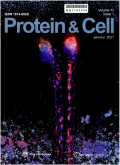A genome-wide RNAi screen identifies genes regulating the formation of P bodies in C. elegans and their functions in NMD and RNAi
摘要:
Cytoplasmic processing bodies, termed P bodies, are involved in diverse post-transcriptional processes including mRNA decay, nonsense-mediated RNA decay (NMD), RNAi, miRNA-mediated translational repression and storage of translationally silenced mRNAs. Regulation of the formation of P bodies in the context of multicellular organisms is poorly understood. Here we describe a systematic RNAi screen in C. elegans that identified 224 genes with diverse cellular functions whose inactivations result in a dramatic increase in the number of P bodies. 83 of these genes form a complex functional interaction network regulating NMD. We demonstrate that NMD interfaces with many cellular processes including translation, ubiquitin-mediated protein degradation, intracellular trafficking and cytoskeleton structure.We also uncover an extensive link between translation and RNAi, with different steps in protein synthesis appearing to have distinct effects on RNAi efficiency. Moreover, the intracellular vesicular trafficking network plays an important role in the regulation of RNAi. A subset of genes enhancing P body formation also regulate the formation of stress granules in C. elegans . Our study offers insights into the cellular mechanisms that regulate the formation of P bodies and also provides a framework for system-level understanding of NMD and RNAi in the context of the development of multicellular organisms.
展开
DOI:
10.1007/s13238-011-1119-x
被引量:
年份:
2011
通过文献互助平台发起求助,成功后即可免费获取论文全文。
相似文献
参考文献
引证文献
来源期刊
引用走势
辅助模式
引用
文献可以批量引用啦~
欢迎点我试用!




